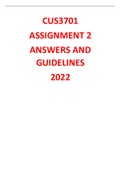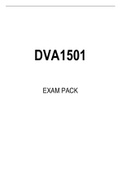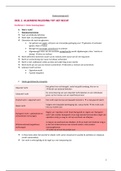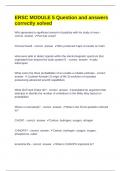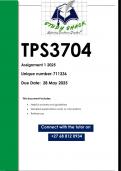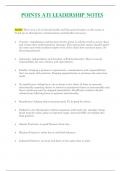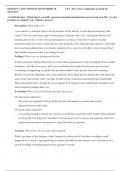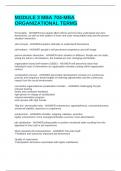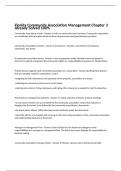EXAM PACK
, UNIVERSITY EXAMINATIONS
September – December 2021
DVA3703
Development Policy and Strategies
100 Marks
Duration 48 Hours
This paper consists of FOUR (4) pages.
Instructions:
This is a portfolio examination conducted on the myExams platform. As this is an open-book
examination, you must use your study guide and prescribed reading material (articles, e-
reserves, marked assignments and feedback). You should also consult and integrate material
from additional sources into your essays.
This module is NOT using the invigilator app. Please note that your answer will be submitted
to the Turnitin (a plagiarism detector) platform automatically.
Follow the guidelines in Tutorial Letter DVAALLD/301 for essay writing, citation and
referencing. You must provide evidence-based arguments and acknowledge the sources of
your information by means of consistent and correct in-text citations. Direct quotations must
be placed in inverted commas (“…”) with a page reference as explained in Tutorial Letter
DVAALLD/301. All sources cited in your text should also be listed in the list of references at
the end of each answer. NB Each answer must have its applicable reference list, do not
consolidate it into one list. Please keep this tutorial letter (DVAALLD/301) at hand and read it
carefully. You can download the tutorial letter from the module site on myUnisa. It is available
in English, Sepedi, and isiZulu.
Plagiarism will be severely penalised. Your essays must be your own work, in your own
words. Group work will be equally penalised as will any form of copying from any student, or
any attempt to commit academic dishonesty. No hand-written scanned-in exam answer
scripts will be accepted in this exam. Only submit word-processed, PDF-converted scripts.
You will be guided on completing a Departmental Honesty Declaration when downloading the
examination paper. For your convenience, we have attached the Honesty Declaration as
Annexure A. Please complete it and add it to your portfolio.
You have 48 hours in which to submit your portfolio on myExams.
Answer any TWO questions below. Each essay should be a minimum of 2 000 words,
excluding the cover page, honesty declaration, table of contents, and list of references. Use
Arial 12 point, 1.5 spacing. Your answer to both questions must be submitted as a single
document in PDF format. Each answer must have an introduction, a body with applicable sub-
headings, a conclusion, and a list of references.
Create a cover page with the following information:
• Your full name
• Your student number
• The module code
1
DVA3703_September-December 2021
, • The module name
• List the two questions you answered (for example, Question 2 and Question 3)
• The date of the exam
QUESTION 1
Explain when and how the process of policy evaluation features in public policy making. In
your essay you are also expected to discuss the significance of this process.
(50)
Required reading for Question 1
• Study guide, study unit 5
• R Mtshali, S.M. (2000). Monitoring and evaluation of women's rural development
extension services in South Africa, Development Southern Africa, 17:1, 65-73;
• Naidoo, V. (2013). ‘The challenges of policy coordination at a programme level: why
joining up is hard to do‘. Development Southern Africa, 30(3): 386-400.)
QUESTION 2
Critically differentiate between the Washington Consensus and the Lagos Plan of Action in
the1980s and 1990s towards stabilising sustainable development.
(50)
Required reading for Question 2
• Study guide, study unit 1
• Mkandawire, T. (2014). The Spread of Economic Doctrines and Policymaking in
Postcolonial Africa. African Studies Review, 57(1), 171-198.
• Naidoo, V. and Mare, A. (2015). Implementing the National Development Plan?
Lessons from co-ordinating grand economic policies in South Africa. Politikon:
South African Journal of Political Studies, 42(3): 407-427.
QUESTION 3
Information-based and learning-oriented tools are action instruments used to structure
collective action to address the policy objectives and implementation. These action
instruments provide links between the various phases in the policy formulation process.
Considering the statement above, critically discuss the policy formulation phases and
substantiate each with practical examples.
(50)
Required reading for Question 3
• Study guide, study unit 6
• Nadvi, L and Piper, L. (2010). “Popular Mobilization, Party Dominance and
Participatory Governance in South Africa” in Thompson L and Tapscott C (eds),
2
DVA3703_September-December 2021
, Citizenship and Social Movements: Perspectives from the Global South, London:
Zed Books.
• Hankivsky, O., & Cormier, R. (2011). Intersectionality and Public Policy: Some
Lessons from Existing Models. Political Research Quarterly, 64(1), 217–229.
QUESTION 4
Analyse and distinguish the central pillars of the institutional environment of policy
making.
(50)
Required reading for Question 4
• Study guide, study unit 3
• Koelble, T. A., Siddle, A. (2014). Institutional complexity and unanticipated
consequences: The failure of decentralization in South Africa. Democratization,
21, 1117-1133.
• Lauridsen, L. S. (2013). From Good Governance to Developmental
Governance - How Policies Institutions and Politics Matter. Forum for
Development Studies, 39(3): 337-366.
(100 marks)
3
DVA3703_September-December 2021


